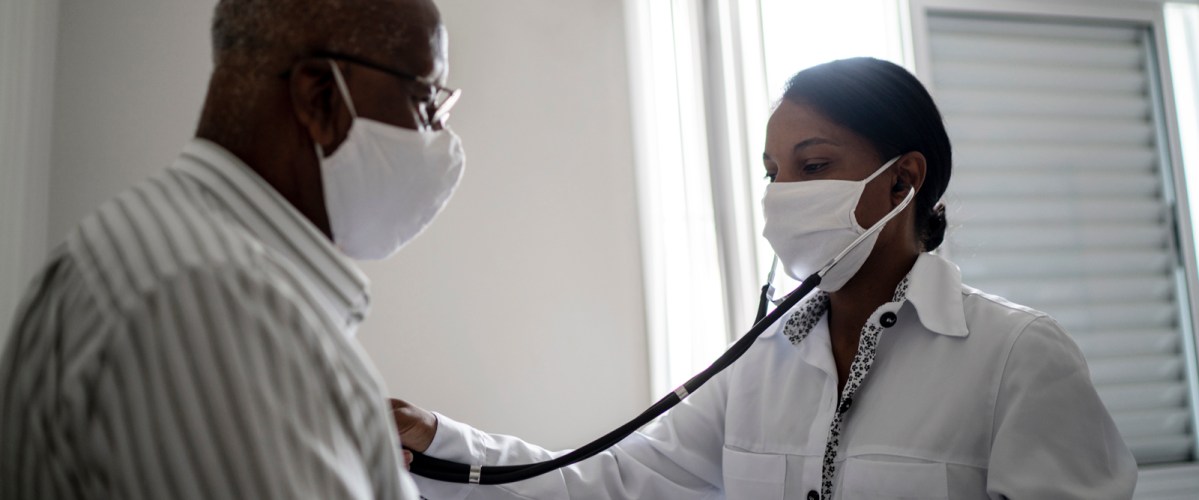|
Listen to this article here
Getting your Trinity Audio player ready...
|
By Karla Robinson, MD, Medical Editor at GoodRx
It’s important to recognize that there are simple actions you can incorporate into your daily routine to protect your heart health. Heart disease is the leading cause of death in the United States, responsible for approximately 1 in 5 deaths each year. Unfortunately, the Black community faces a disproportionate impact of heart disease, with a 30% higher likelihood of dying from heart disease than other racial groups.
This is a terrifying reality that we face. While risk factors like diabetes, obesity, and an unhealthy diet can play a role in causing heart disease, the roots of the issue are much deeper.
Limited access to healthcare, racial discrimination, and environmental conditions in Black communities contribute to negative health outcomes. For example, Black communities often lack access to cardiologists.
According to GoodRx Research, more than 16.8 million Black Americans live in counties that are considered cardiology deserts, meaning a commute of over 80 miles is required to reach the nearest cardiology clinic, and an additional 2.5 million Black Americans live in counties with no cardiologists at all.
But it isn’t all doom and gloom. Fortunately, companies like GoodRx are already making a significant impact on health outcomes for the Black community and beyond.
A recent study revealed that GoodRx has directly contributed to preventing at least 140,000 emergency room visits and 110,000 hospitalizations for major cardiovascular events like heart attack and stroke by helping users afford their prescription medications.
You also have the ability to make an impact. By knowing and taking proactive measures to prevent heart disease, you have the power to protect your heart health and play a role in minimizing the risk.
Advocate for Yourself
The first step to managing your heart health is recognizing that you are your own best advocate. Unfortunately, the Black community may not always receive the same quality of care as white patients due to racism or unconscious biases that exist. As a result, our concerns and requests can be quickly dismissed at the doctor’s office. Sometimes you may not even realize it’s happening!
As a doctor, I’m here to tell you that it is okay – expected even – to ask questions during your medical appointments and speak up if you feel you aren’t getting the care you need. It’s also okay to switch providers if you aren’t feeling respected.
And, a pro tip: have a conversation with your family members about their medical history to determine your genetic risk for developing heart disease and have this information readily available when discussing your health with your doctor. If your parents or siblings have heart disease, your risk goes up by 40% to 75%.
Exercise and Maintain a Healthy Diet
Although there are risks of heart disease that are beyond our control, maintaining a balanced diet and exercising regularly play a significant role in overall heart health. I understand that access to healthy foods and having the resources for regular exercise may not always be readily available. However, there are some simple practices you can incorporate into your daily life to support a healthy heart.
For example, consider buying frozen produce rather than fresh produce, as it offers the same nutritional value and lasts longer. If you do buy fresh fruits and vegetables, try to buy them when they are in season as they tend to be more affordable.
I also understand that some soul and comfort foods are deeply rooted in the traditions of the Black community. While some of these dishes may traditionally contain unhealthy ingredients, it doesn’t mean you have to give up on them.
Thankfully, there are healthier alternatives available. Instead of relying on salt, you can experiment with other flavorful seasonings with lower sodium content, and rather than using butter or lard, consider using alternatives like peanut or canola oil. Additionally, when cooking your food, try cooking methods like grilling or broiling to limit the trans fats of oils, which can be very harmful to your heart health.
As for staying active, the American Heart Association suggests that adults should aim for 150 minutes of moderate intensity exercise each week. You can achieve this by incorporating low-impact activities like walking, jogging, as well as strength training into your daily routine. If you don’t have access to weights, everyday household items like plastic bottles, cans or books work well, too.
Monitor Your Heart Health
To stay on top of your heart health, there are methods you can use to monitor it conveniently from the comfort of your home – in addition to your regular annual check-ups with your doctor.
One option is to use a heart rate monitor, which can help track your resting and active heart rate, making it easier to detect any irregular heart rhythms. There are several smart wearable devices you may be familiar with that can track your heart rate, but they can be expensive and not covered by insurance.
However, there are more affordable alternatives available, and insurance will typically cover at-home heart monitoring devices if considered medically necessary and prescribed by a doctor.
You can also use a blood pressure monitor at home to help you keep an eye on your blood pressure more regularly. More than half of Black adults are affected by high blood pressure, which is three times more than white adults.
The scary thing about blood pressure is that it is often referred to as a “silent killer” due to its lack of noticeable symptoms, so monitoring your blood pressure at home is important. You can purchase an automated home blood pressure monitor online, and your insurance may cover the costs if you have a prescription from your healthcare provider.
There are also several free heart health apps that can help monitor your diet, weight, cholesterol levels and medication intake to ensure that your heart is on a healthy track.
Access Cost-Effective Medications & Expert Advice
To help ease the financial burden associated with cardiovascular medications and gain a better understanding of heart disease, you can visit the GoodRx Heart Center. You can find discounts on prescriptions, such as Soaanz, Repatha, Lodoco, Entresto, Jardiance, Toprol XL, and XARELTO, as well as free resources written by trusted healthcare experts that can help you navigate risk factors, associated conditions, and treatment options.
Let’s not forget to prioritize our heart health, not only during American Heart Month, but all year long, as we work together to make progress in the prevention and management of heart disease.
Karla Robinson, MD, is a medical editor for GoodRx, a fellow at the American Academy of Family Physicians and has served as a regular health contributor for local and nationally televised news programs, online and national publications, various blogs and news outlets.

She is a licensed, board-certified family physician with almost 20 years of experience in health through varied clinical, administrative, and educational roles. She has served in primary care through traditional private practice, concierge medicine, and in community medicine as a medical director at a federally qualified health center (FQHC).
She continues to serve clinically through telemedicine, providing access to reproductive health services. She is also committed to preparing the next generation of healthcare providers and teaches classes to physician associate students in clinical laboratory medicine and medical wellness.


